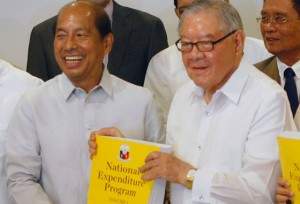Measure pushed in budget message
DRAWING flak for not mentioning the controversial Freedom of Information (FOI) bill in his final State of the Nation Address (SONA), President Benigno Aquino 3rd on Tuesday asked Congress to pass the proposed law to cement transparency in government.
The Senate has already passed Senate Bill 1733 -- its version of the proposed FOI Law -- on March 10, 2014 but its counterpart measure in the House of Representatives remains pending.
House Bill 3237 or the proposed FOI Law establishes the legal presumption that people should have full access to government information. It enumerates instances when data must be published online or transmitted to those interested “without the necessity of demand.”
The bill, authored by Camarines Sur Rep. Maria Leonor Robredo and Batanes Rep. Henedina Abad, remains pending in the House of Representatives.
In his message to lawmakers on the proposed 2016 budget, Aquino enumerated his administration’s policies or reforms “that establish greater fiscal openness” such as the reduction of lump-sum funds, the Transparency Seal program and Open Data Philippines initiative.
“To ensure the permanency of transparency policies, we urge Congress to pass the Freedom of Information Act,” he said.
The budget message was released to the media a day after the President delivered his sixth and last SONA on Monday.
By reducing lump-sum funds and presenting a budget plan with detailed programs and projects, according to Aquino, the government reduces opportunities for corruption while speeding up the budget execution process.
“We firmly believe that greater fiscal transparency leads to a more responsive government,” he said.
Aquino added that through his other transparency initiatives, citizens have improved understanding of the national budget and faster access to information on government finances and operations.
“By publishing performance information through the Performance-Informed Budgeting and the regular budget reports, we also empower them to hold us accountable for the results of our actions,” the President said.
He assured that these policies will still be embedded in the proposed budget for 2016.
Aquino claimed that his reforms have “dramatically improved” the country’s standing in global benchmarks of budget transparency.
He cited the International Monetary Fund, which has declared that the Philippines “exhibits good and advanced practices in several areas of its new Fiscal Transparency Code.”
The International Budget Partnership’s Open Budget Survey Tracker showed that the Philippines is now publishing all required budget documents, Aquino said.
Ready for plenary
Akbayan party-list Rep. Ibarra Gutierrez 3rd earlier said the FOI bill will be ready for plenary debates next month.
Gutierrez noted that the bill “was not given the opportunity to be discussed in plenary” because Congress spent much of its time tackling the proposed Bangsamoro Basic Law (BBL).
“What we want to happen after the State of the Nation Address is for the House to give time to the FOI sponsorship speech, either within the same week or by August, before the budget deliberations,” he said.
He described the House version of the FOI bill as a “good version,” owing to its open data provisions, including a mandatory disclosure clause for budgets and expenditures, as well as the Statement of Assets, Liabilities and Net Worth (SALN) of government officials and
employees, including judges.
At present, the Supreme Court screens requests made to access the SALN of its justices.
Gutierrez said the House version also requires contracts for projects commissioned by the government to be uploaded online.
He added that the Senate version “is a classic FOI that is demand-driven.”


